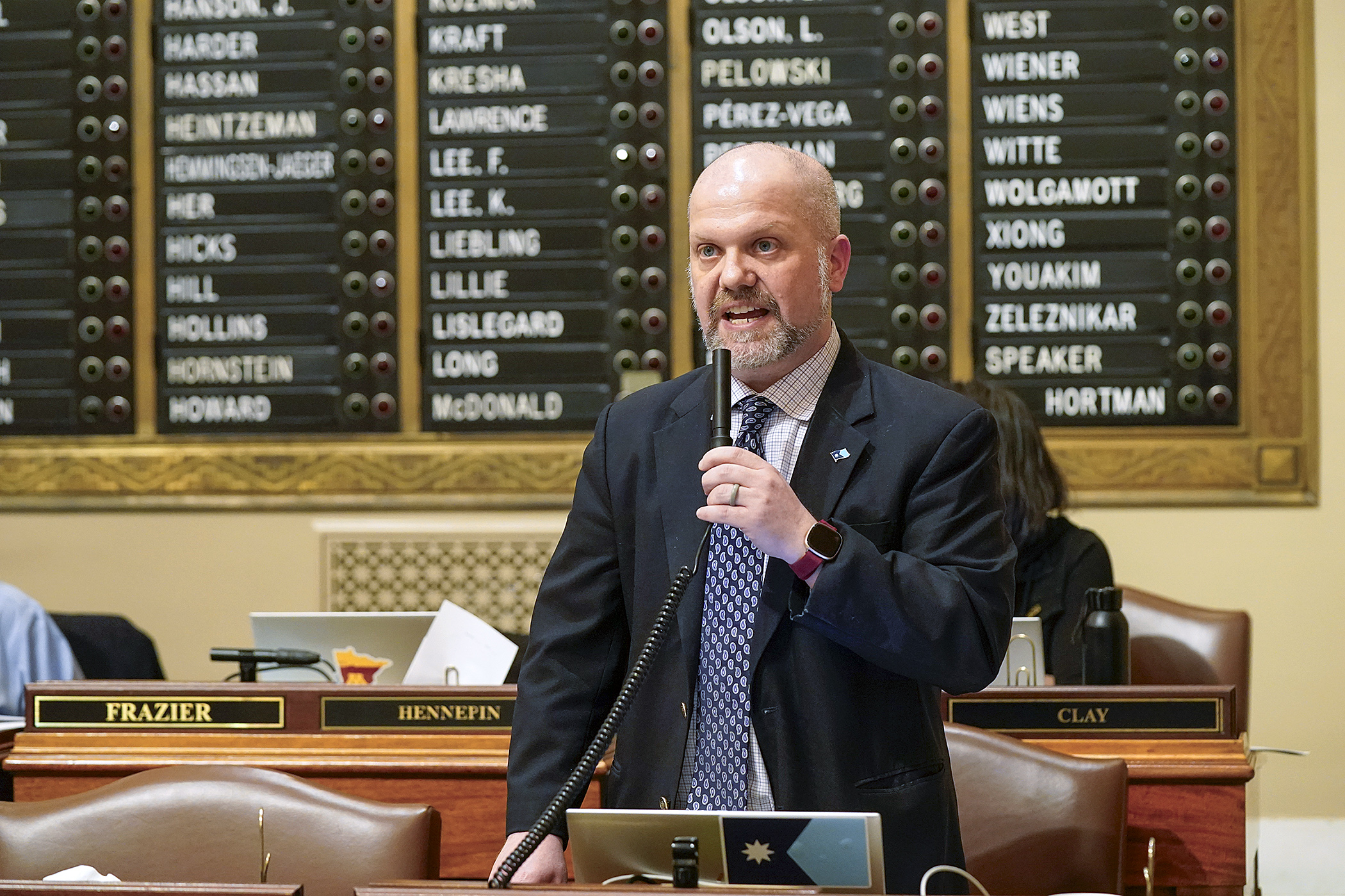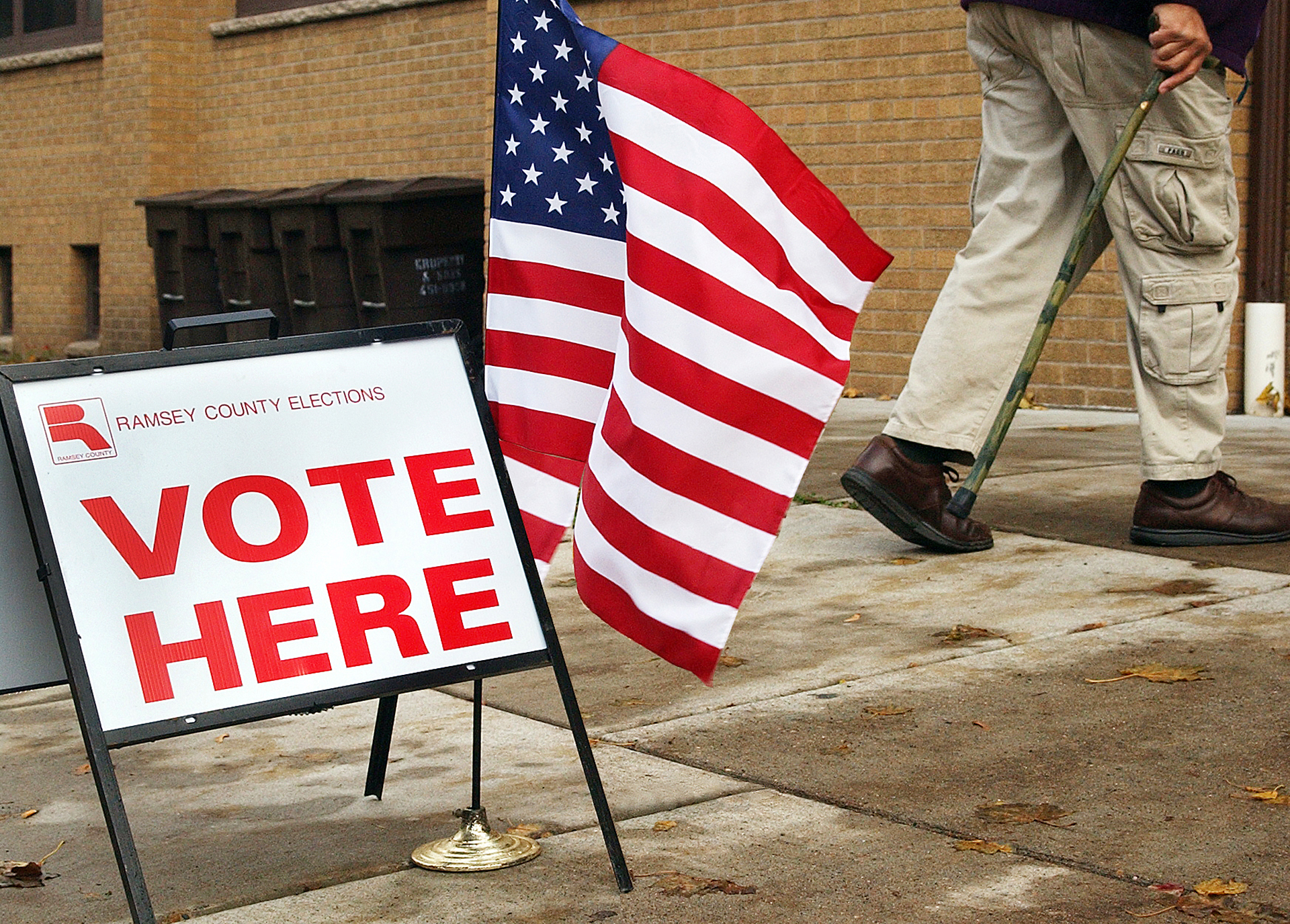Elections policy bill clears a divided House

The November election is just under seven months away, but a plethora of changes to how and when people vote are key components of the 2024 elections policy bill.
It includes provisions relating to ballot box access, especially for younger voters; access for voters of color; and banning prison gerrymandering.
Also included are provisions related to the use of deepfakes, lobbying reporting, and school board appointments versus special elections for a vacancy.
Passed 69-62 by the House Monday evening, HF4772, as amended, now goes to the Senate.
“The bill corrects historical wrongs and federal mistakes, it improves clarity of how our elections are influenced, and it expands voter access for eligible voters,” said Rep. Mike Freiberg (DFL-Golden Valley), the bill sponsor.
At a at a pre-session news conference by the Inclusive Democracy Caucus, Rep. Emma Greenman (DFL-Mpls) added: “It really builds on last session which we took really great strides to strengthen the freedom to vote and expand inclusive, multi-racial, multi-generational participation in Minnesota. Our democracy works when everybody has a voice in the decision making.”
[MORE: Watch the press conference]
Lacking bipartisanship was a key reason for Republican objections.
“Governors in the past have demanded that elections bills be bipartisan, and this one is not,” said Rep. Paul Torkelson (R-Hanska), noting zero Republican-sponsored bills are in the final package.
Added Rep. Isaac Schultz (R-Elmdale Township): “You haven’t earned bipartisan support on this bill because you didn’t seek to.”
Among the bill hallmarks, supporters say, is the “Minnesota Voting Rights Act” that aims to ensure access and that no one is denied an equal opportunity to vote.
Coming from the Greenman-sponsored HF3527, it would do so, in part, by prohibiting state voting standards that would deny or limit any citizen’s right to vote based on their race, color or language. Examples could include insufficient polling places, redistricting plans that “pack” persons of color to weaken their voting strength, and lack of language assistance for voters whose first language is not English. It would also ensure a private right of action and allow both sides a way to work together to rectify a problem without going to court.
Passed in 1965, the Federal Voting Rights Act prohibited racial discrimination in voting. However, the Eighth Circuit Court of Appeals ruled in November 2023 that voters themselves in the court’s district can no longer challenge racially discriminatory laws or restricting plans under federal law.
“This will be the first time we put into Minnesota law prohibitions against discriminating based on race in voting,” Greenman said.
Added Rep. Cedrick Frazier (DFL-New Hope) at the news conference: “Every Minnesotan, regardless of their background, deserves equal access to participate in our democratic process. By bolstering our Minnesota Voting Rights Act we are defending the fundamental right of all Minnesotans and promoting a more inclusive democracy.”
Rep. Harry Niska (R-Ramsey) unsuccessfully offered an amendment to delete the voting rights act language.
Inmate counts
Beginning with the 2030 census, prisoners would be counted as residing where they come from rather than the location of the correctional facility.
 (House Photography file photo)
(House Photography file photo)“Prison gerrymandering is an unfortunate flaw in the census collection system that over time has led to imbalances on population count. While the census bureau has not decided to act on this, states can,” said Rep. Esther Agbaje (DFL-Mpls), who sponsors the change as HF4043. She said this is currently done with military members, college students and others who reside in one place but are doing time or service elsewhere.
Torkelson said prison operations have direct impacts and costs on the community where it is located, and the local unit of government should not lose funding because someone is counted as residing elsewhere.
Having the change not apply to inmates who’ve served more than 10 consecutive years in incarceration or have more than a decade remaining on the sentence was the gist of an amendment from Rep. Ben Davis (R-Merrifield). It was not adopted.
Campus voting
Speaking of college students, the bill would require designation of an additional polling place for at least one day on the campus of a postsecondary institution if requested by the institution or the student government organization.
Rep. Kristi Pursell (DFL-Northfield), who sponsors HF3447, said only one of the two campuses in her hometown has an on-campus Election Day polling location. “We can absolutely see in real time in my small district the differences in voter engagement. … We know the barriers for students to vote is likely their first election, they almost certainly don’t have transportation or they’re trying to squeeze in voting between classes, extracurriculars (and) work.”
School board appointment vs. election
Under current law, a vacancy can be filled by a school board appointment until a special election is held; however, a special election is not required if the vacancy occurs less than 90 days prior to Election Day in the third year of the member’s term.
Coming from HF4287, sponsored by Rep. Bianca Virnig (DFL-Eagan), the bill would eliminate the need for a special election if the vacancy occurs less than two years prior to the term’s expiration.
Rep. Dean Urdahl (R-Grove City) successfully added an amendment whereby a special election must be held for that seat if a board member is removed for cause.
[MORE: Other provisions in the bill]
Related Articles
Search Session Daily
Advanced Search OptionsPriority Dailies
Speaker Emerita Melissa Hortman, husband killed in attack
By HPIS Staff House Speaker Emerita Melissa Hortman (DFL-Brooklyn Park) and her husband, Mark, were fatally shot in their home early Saturday morning.
Gov. Tim Walz announced the news dur...
House Speaker Emerita Melissa Hortman (DFL-Brooklyn Park) and her husband, Mark, were fatally shot in their home early Saturday morning.
Gov. Tim Walz announced the news dur...
Lawmakers deliver budget bills to governor's desk in one-day special session
By Mike Cook About that talk of needing all 21 hours left in a legislative day to complete a special session?
House members were more than up to the challenge Monday. Beginning at 10 a.m...
About that talk of needing all 21 hours left in a legislative day to complete a special session?
House members were more than up to the challenge Monday. Beginning at 10 a.m...